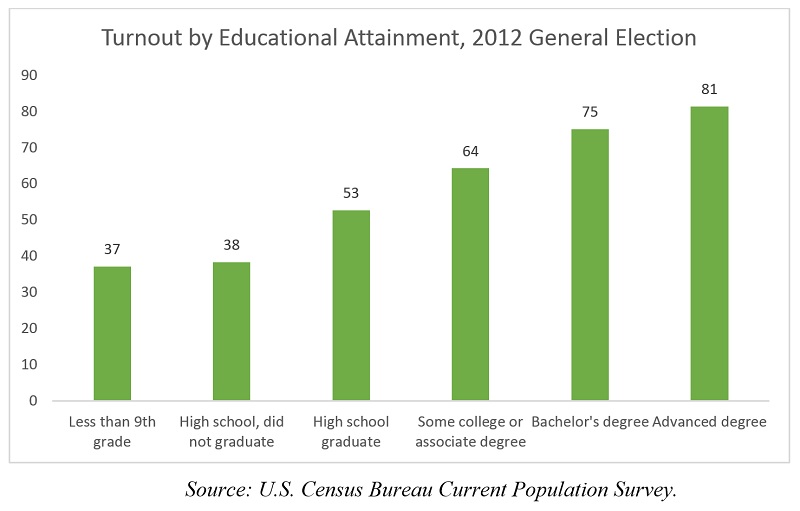The data speaks in a clear voice and it speaks a
Post# of 65629
Quote:
The data speaks in a clear voice and it speaks a simple message: the Republican Party can have Donald Trump or it can have a future, but it cannot have both.
http://thefederalist.com/2016/02/22/why-donal...ite-house/
Quote:
Voting propensity is strongly correlated with educational attainment. The more educated one is, the more likely one is to vote.
Unsurprisingly, therefore, the two most reliable voting groups in the United States are voters with bachelor’s degrees and those with post-graduate degrees. The following chart, drawn from the 2012 election review by the Census Bureau’s Current Population Survey, shows that these two groups turned out at rates of 75 percent and 81 percent, respectively.
Even those who attended but did not finish college had a voting rate higher than 60 percent. The rate for high school graduates was just over 50 percent, and it declined sharply for those who did not finish high school.

There is simply no way a candidate can win a presidential election now by losing the biggest turnout group by ten or more points, as polls consistently show Trump doing.
College graduates cannot stand Trump, and this surely is no small factor in him having the highest negative rating of any presidential candidate Gallup has ever tested. Sixty percent of Americans have an unfavorable view of Trump. That kind of radioactivity usually requires a Geiger counter to measure.
College graduates vote more, and there are more of them who vote. According to the 2012 exit polls, 47 percent of voters had at least a four-year degree. Another 29 percent spent at least some time enrolled on campus. That adds up to 76 percent. The overlap is not perfect, but if working-class voters are defined as voters with no more than a high school education, then Trump’s hopes rest on taking larger and larger bites from a cherry.
Evidence Trump Haters Won’t Switch Sides
A Trump backer might rejoin that I am merely speculating that college-educated Republicans would not flock to Trump if he became the nominee. Supporters of one candidate during a primary often say they won’t support his opponent but rally around the party flag for the general election. This is a fair point. It is hard to prove a negative,
especially one that hasn’t happened yet.
There is some evidence, however, to indicate Trump may not benefit from this normal pattern.
There are few analogues to Trump in recent years. One who resembled the magnate, at least in his capacity for intemperate remarks, was Todd Akin. In the last poll conducted before he devoured his leg, Akin led his 2012 Missouri Senate race against incumbent Claire McCaskill by 11 points.
This included a one-point advantage with college graduates, 46 to 45 percent. Yet on Election Day, Akin lost college graduates 50 to 44 percent, a seven-point swing. Moreover, 15 percent of Republican voters defected and voted for McCaskill.
Another GOP Senate candidate who made foolish remarks about abortion in 2012 was Richard Mourdock of Indiana. He managed to win college-educated voters, but like Akin he bled considerable Republican support: 14 percent of Hoosier Republicans backed Democrat Joe Donnelly, who won.
In 2010, Sharron Angle, the controversial GOP Senate nominee in Nevada, lost 11 percent of Republicans to Harry Reid. Her Colorado counterpart, Ken Buck, saw 10 percent of Republicans shift to Michael Bennett.
Most instructive, perhaps, is the 2008 presidential election, which saw Barack Obama win 9 percent of Republicans and an astounding 20 percent of self-described conservatives.
Given the aspirational qualities of Obama’s candidacy, we should not be surprised he had so much cross-ballot appeal. Nine or 10 percent is not much in a decisive contest like his first presidential campaign, but in a close election or a swing state it could be the difference between victory and defeat.
Donald Trump Means the End of the Republican Party
Trump doesn’t make inflammatory comments about rape or abortion. That’s because he’s too busy making them about everything else: immigration, foreign policy, economics, his rivals, journalists, you name it. His peanut gallery roars, but the rest of the country is unimpressed.
A Trump-inspired descent into white identity politics would be a cataclysm for the GOP because it would alienate the very voters it needs if it wants the White House back. It must get at least a few voters for whom cultural affinity outweighs partisan affiliation. There is no way to win without them. Trump’s campaign, on the other hand, depends on pursuing voters who don’t exist at the cost of those who do.
It is well and good to appeal to the working class. It behooves the GOP to do so. There is great merit in criticizing the GOP and its leadership and policy cadres, which often seem to care about little more than hunting such mythical beasts as the flat tax while pretending to pay lip service to any number of causes dear to its rank and file.
I have myself avowed that the GOP establishment (and donor class) deserve “incineration.” But Trump should not be the instrument of vengeance. For that sword, once drawn, will be sheathed only with difficulty.
By now you have surely begun to suspect that I oppose Trump. You’re right. I oppose him on philosophical and ideological grounds.
But I also oppose him for practical reasons. Nominate Trump, and the GOP would lose college-educated voters for at least a generation, and possibly forever.
With them would go the prospect of ever again winning states like Colorado, Pennsylvania, Ohio, and Florida. So, without them, would the GOP be finished as a national party, and perhaps as any kind of party at all.
The data speaks in a clear voice and it speaks a simple message: the Republican Party can have Donald Trump or it can have a future, but it cannot have both.
 (0)
(0) (0)
(0)